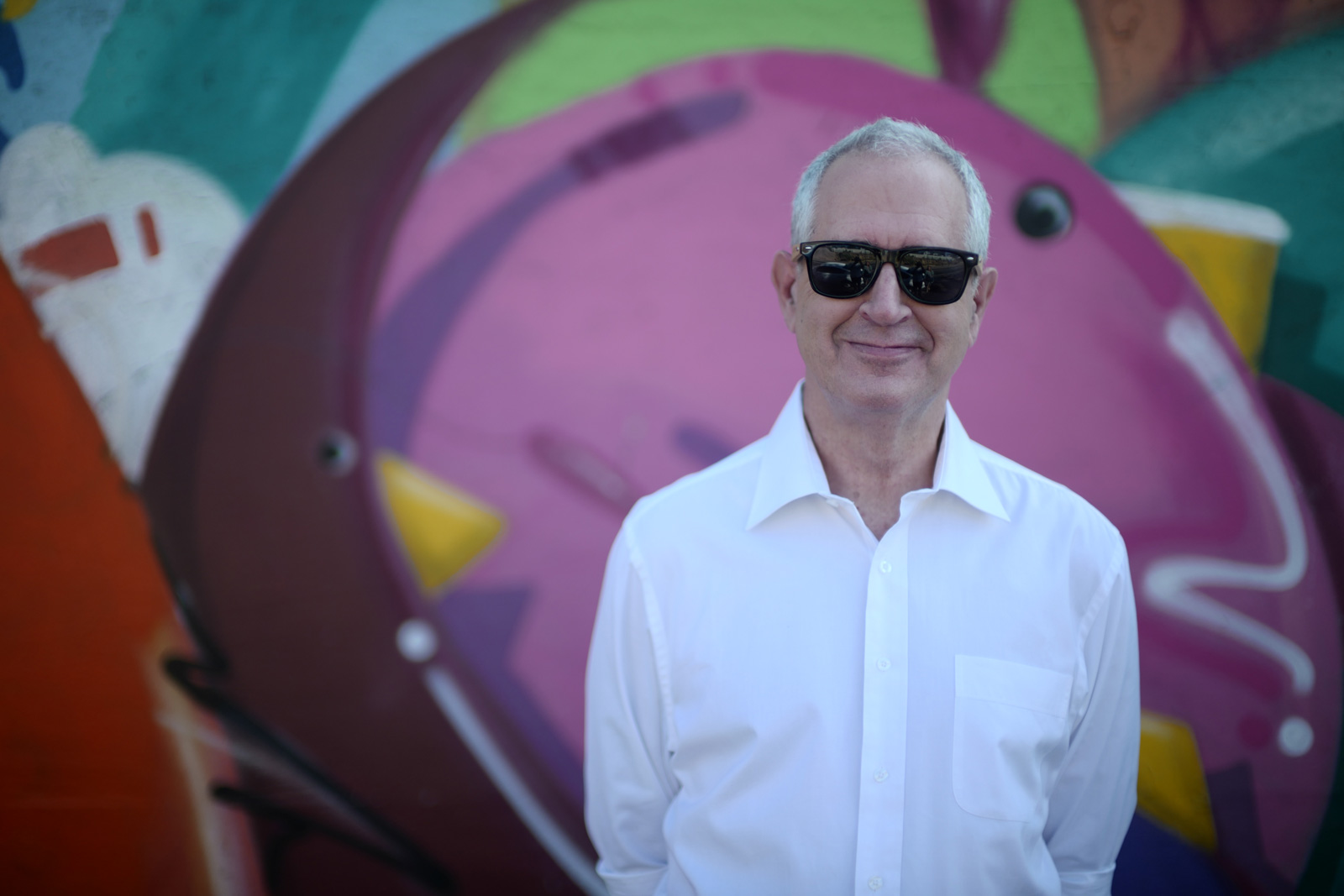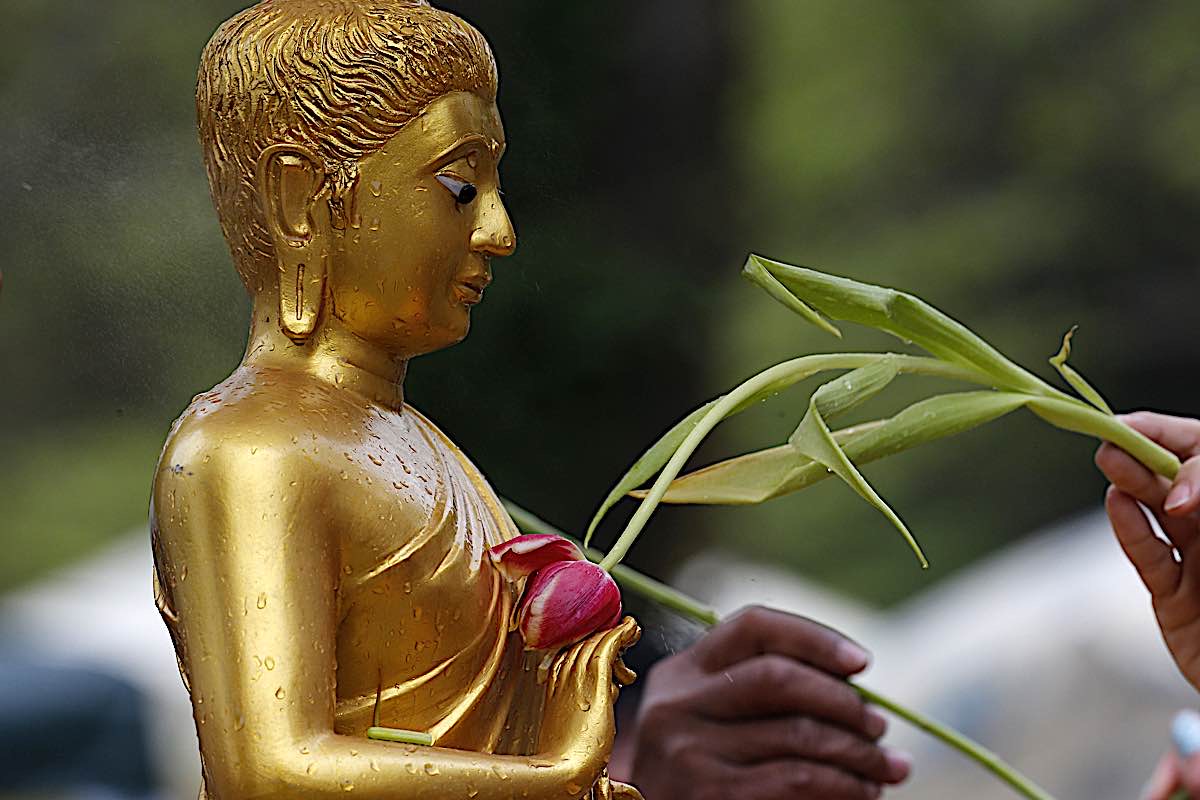David Nichtern Wants to Make You Healthy, Wealthy, and Wise
The musician, entrepreneur, and Buddhist teacher discusses his book Creativity, Spirituality, and Making a Buck and uniting our work and spiritual lives. The post David Nichtern Wants to Make You Healthy, Wealthy, and Wise appeared first on Tricycle: The...

Join David Nichtern for “Right Livelihood in Times of Economic Instability,” a virtual event on Wednesday, October 26 (4-5 p.m. ET). This event is part of Tricycle’s weeklong series Living Well in Difficult Times, featuring leading Buddhist teachers and thinkers—including Stephen Batchelor, Sylvia Boorstein, and Kaira Jewel Lingo—in conversation on how to thrive under any circumstances. Sign up for free now.
David Nichtern is, by most metrics, a very successful person. As a longtime practitioner in the Shambhala lineage of Tibetan Buddhism, he has been empowered as a senior teacher and has served as the director of Karme Choling Meditation Center in Vermont and the Dharmadhatu Meditation Center in Los Angeles. As a musician, he won four Emmy awards, has been nominated for a Grammy twice, founded Dharma Moon and 5 Points Records, and has worked with Stevie Wonder, Jerry Garcia, Lana Del Rey, Maria Muldaur, and Paul Simon, to name a few.
In a new book, Creativity, Spirituality, and Making a Buck (Wisdom, October 8, 2019), he offers his advice from both sides of his life on how to figure out what one wants to do and how to get there. Tricycle spoke with Nichtern about the book and his conviction that we do not need to separate our spiritual pursuits and our career goals.
You titled your book Creativity, Spirituality, and Making a Buck, three topics that aren’t often talked about in the same breath. What inspired you to write a book about this?
This book is the culmination of my actual life as a practitioner, a creative, an entrepreneur, and a businessperson, and it challenges the long-accepted divide between spiritual life and the way we operate in the world, in which our livelihood and issues of money are seen as soiled. On the one hand, people will say that a yoga class should be free, and on the other hand, people have the notion that topics like ethics should be reserved for church on Sunday. “Render unto Caesar what is Caesar’s.” But all of those elements exist together in people’s actual lives. The people in the spiritual communities and the secular communities are the same people.
The third piece, after spirituality and making a living, is creativity, which speaks to our individual life journeys, or what I call the life puzzle. Every person comes to a point where they need to express themselves as a unique individual. Some people might think that goes against Buddhist teachings on non-self or non-ego, but that’s a total misunderstanding of the definition of anatman (Skt., no-self). We do exist individually, but we don’t exist absolutely individually.
A fundamental Buddhist teaching is that the path to end suffering involves letting go of desire, but this book teaches people how to pursue their goals. Where does your work fit within the renunciant traditions?
It’s important to be extremely precise about the root of suffering. The origin of suffering is not desire, but attachment, fixation, or objectification of the desire. And the operation where you cling to your projections and solidify them is what is being renounced. There is a hidden question here: Is it possible to have a career, a livelihood, or a relationship that does not become fuel for clinging, and therefore create further suffering?
In the renunciant path, they say, no, you can’t do it. For certain people, that is the appropriate path. It was the right path for Pema Chödrön, who was a household practitioner and decided to become a nun. It’s an honorable tradition within the Buddhist world, and the monastics and the nuns are centrally located historically. But so are the householder yogis and the patrons, who are part of the larger society.
Related: Death, Sex, Enlightenment & Money
In today’s society, we have little to no role for renunciation. We don’t have the type of framework that was once common in India and Tibet. People who don’t work are called hippies or bums. So we have to move toward creating a relationship to livelihood that doesn’t create further suffering.
One of the practices you offer in the book is metta meditation, which you apply to the business advice to not negotiate against yourself. How do those fit together for you?
When you start a job, for instance, you negotiate an agreement to work at that place. Now, if you have low self-esteem, you probably didn’t create the optimal circumstance to be appreciated and respected for what your capabilities are. Negotiating against yourself, in the broader sense, is a matter of not being kind to yourself, not appreciating yourself. And on the flip side, you don’t have to be an arrogant psychopath either. It’s a middle way kind of situation.
Working a job or being involved in the business world is an extraordinary learning opportunity and a very underrated spiritual training ground. You spend eight hours a day at work, but only 20 minutes to an hour a day practicing on the cushion. But those eight hours are also a practice. You’re practicing being kind to yourself, having compassion for others, being insightful, developing good work habits, teamwork, leadership, and so on.
You also write about self-deception. How do you suggest we find the balance between self-compassion and self-criticism in our careers?
The short answer is: it’s no different from anywhere else where you spend time and create relationships. The underlying principles are the same because there’s only one person, which is you. Those principles are mindfulness, awareness, compassion, consideration for others and for oneself, a sense of adventure and enjoyment, and appreciation for life itself. None of that is excluded from the sense of personal journey that each of us are undergoing.
I’ve watched spiritual communities develop for 50 years, and up until recently, this part of people’s lives has been a huge missing link. People go get money so they can go off on their retreats, as if the job itself were unholy. I was taught that the job is part of the sacred environment.
The term McMindfulness is often used to criticize people for using spiritual practices without an ethical framework. How is your project different from mindfulness as a way to relieve stress so that employees can work harder?
That’s a good question. Sometimes what is being taught is what I would call pre-mindfulness, which is relaxation—like using a body scan to improve sleep. I don’t see any big harm in that; it’s better than taking an Ambien, for sure. But it’s pre-meditation. Mindfulness involves both relaxation and becoming more aware of what’s going on by focusing the mind and observing non-judgmentally. If you teach somebody how to do that practice, you may not be taking them all the way to full realization, but you’re helping them to work with their minds, to become more stable and focused, and to relieve stress, which is certainly a form of suffering.
You’re suggesting that the boss at the office could usurp that practice: “Great. Now that you’re focused, work harder, work more efficiently.” And I’ve said before that mindfulness alone could make somebody a better assassin. I have some meditation students who are coming from the corporate world, and the thing I tell them is that there is a second stage—the B-side of the mindfulness record—and that is related to discovery, ethics, and compassion.
I start every student with mindfulness, and so would any classical monastic Buddhist—the Karmapa [the head of the Karma Kagyu lineage of Tibetan Buddhism], for example. After developing focus and stability, there’s a second step, which is making friends with yourself and understanding yourself and the world better. Then the third process, which I call transformation, involves shifting your habits to make them more beneficial for other people. And those practices actually apply very well to leadership and teamwork.
What role does creativity play in this schema?
Creativity is important to me because I’m a musician. That’s how I’ve made my living. My whole adult life I have had to make things up and get you to pay me for it. Otherwise, I can’t pay my rent. What I do is completely subjective in a way. It comes from nowhere; no one can explain where creativity comes from. Yet, whether or not you call yourself a creative, every human being is creative all the time.
Even though from a Buddhist point of view our sense of individuality might be distorted, our sense of being an individual, creative force in the universe is not distorted. Each flower, each tree, each insect has its own individuality. This is a tremendous part of whether people are happy or not.
Related: Why Right Livelihood Isn’t Just About Your Day Job
I make a distinction between your offering—poetry, music, art—and your livelihood. They can be the same thing, but that is a huge choice. The day you say, this is what I want as my livelihood, there’s another conversation to be had that can be very helpful. I know a lot of people who say, I’m doing this, but I’d really rather be doing that, and a lot of what they need to learn is simply business skills: how to make contacts, how to negotiate deals, understanding royalties and intellectual property, and so forth.
A lot of the advice you offer seems to have nothing to do with spirituality. For example, you write about the importance of understanding intellectual property. Why did you include those sections?
The whole thrust of the book is saying, find your vision, and once you do, then begin to bring it down to earth. This is the principle of joining heaven and earth, a classical paradigm in Asian thought. Heaven is the progenitor or the primordial—the pure realm of mind or consciousness in Buddhist terms. Earth is the realm of relative reality, which is subject to impermanence. If people have too much heaven, they have vision but don’t know what to do with it. If they’re too mired in the earth, they have no vision, no direction, no kind of ultimate sense of what they’re doing.
So, you’re right. A lot of what I discuss in the book is earthly wisdom. But many spiritual people have bypassed earthly wisdom at their own risk. Let’s say your cabinet is falling off, and you see that you need a Phillips head screwdriver. If you have the right tool and understand that tool, you’d be able to fix your cabinet. Otherwise you have somebody who’s supposedly enlightened but they’re standing there with a flathead screw and a Phillips head screwdriver. To me, that is not an enlightened person.
It reminds me of when you see a spiritual center with terrible graphic design.
Or a funky website that makes it hard to get information or register, or when you get there, stuff is not working. I firmly believe that there’s a way to integrate these things that’s positive for everybody.
A lot of people harbor stress and shame around issues of money. Did that factor into your decision to write the book?
Sure. Stress and shame are spiritual problems. Those are not financial problems. There’s nothing inherent that I can see about proper livelihood that needs to be stressful or shameful. But those are obstacles. When someone bypasses that by saying I’m spiritually enlightened, but I’m stressed out and shamed about livelihood or money, what I hear is that’s the next area that really needs to be illuminated. That doesn’t mean becoming a greedy, stuffed pig. It means being a healthy person.
This interview was originally published on October 8, 2019.

 JaneWalter
JaneWalter 
































